Civil Law Assignment: Analysis of the Opioid Crisis Management Act
VerifiedAdded on 2023/01/19
|5
|840
|58
Homework Assignment
AI Summary
This civil law assignment delves into the Opioid Crisis Management Act of 2018, examining its implications for healthcare and pharmacy practices. The assignment addresses key aspects of the Act, including its objectives, the role of pharmacy technicians, and its impact on patient care and opioid prescription. It explores the Act's influence on health and safety, the rehabilitation of substance abusers, and the funding of medical institutions. The assignment also discusses potential changes in the pharmacy profession, emphasizing the importance of medical ethics and the prevention of opioid abuse. Furthermore, the assignment analyzes the codification of Medication-Assisted-Treatment prescriptions and the limitations set for nurses and physicians. The references provided support the analysis with research on opioid abuse and the effectiveness of the Act.
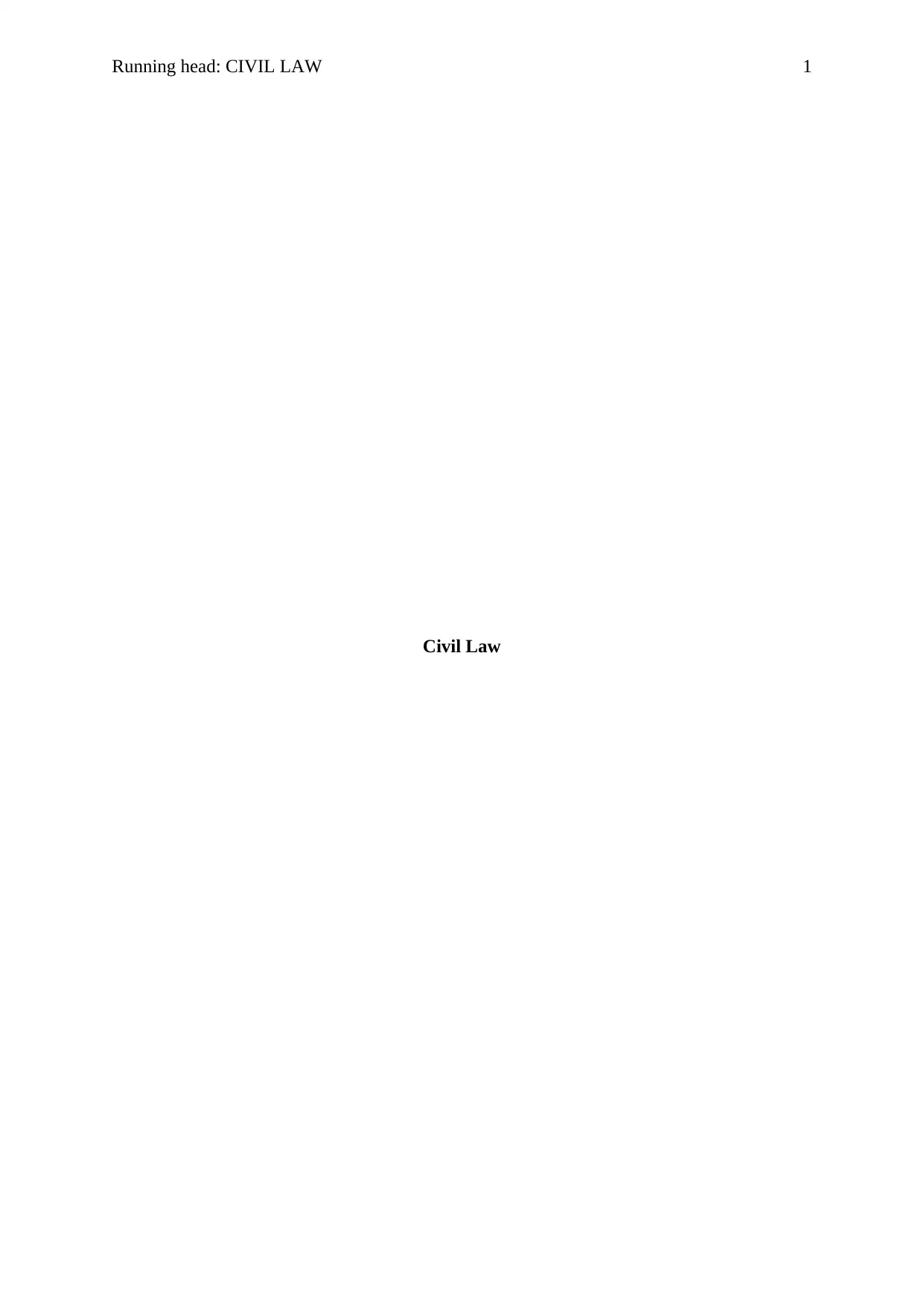
Running head: CIVIL LAW 1
Civil Law
Civil Law
Paraphrase This Document
Need a fresh take? Get an instant paraphrase of this document with our AI Paraphraser
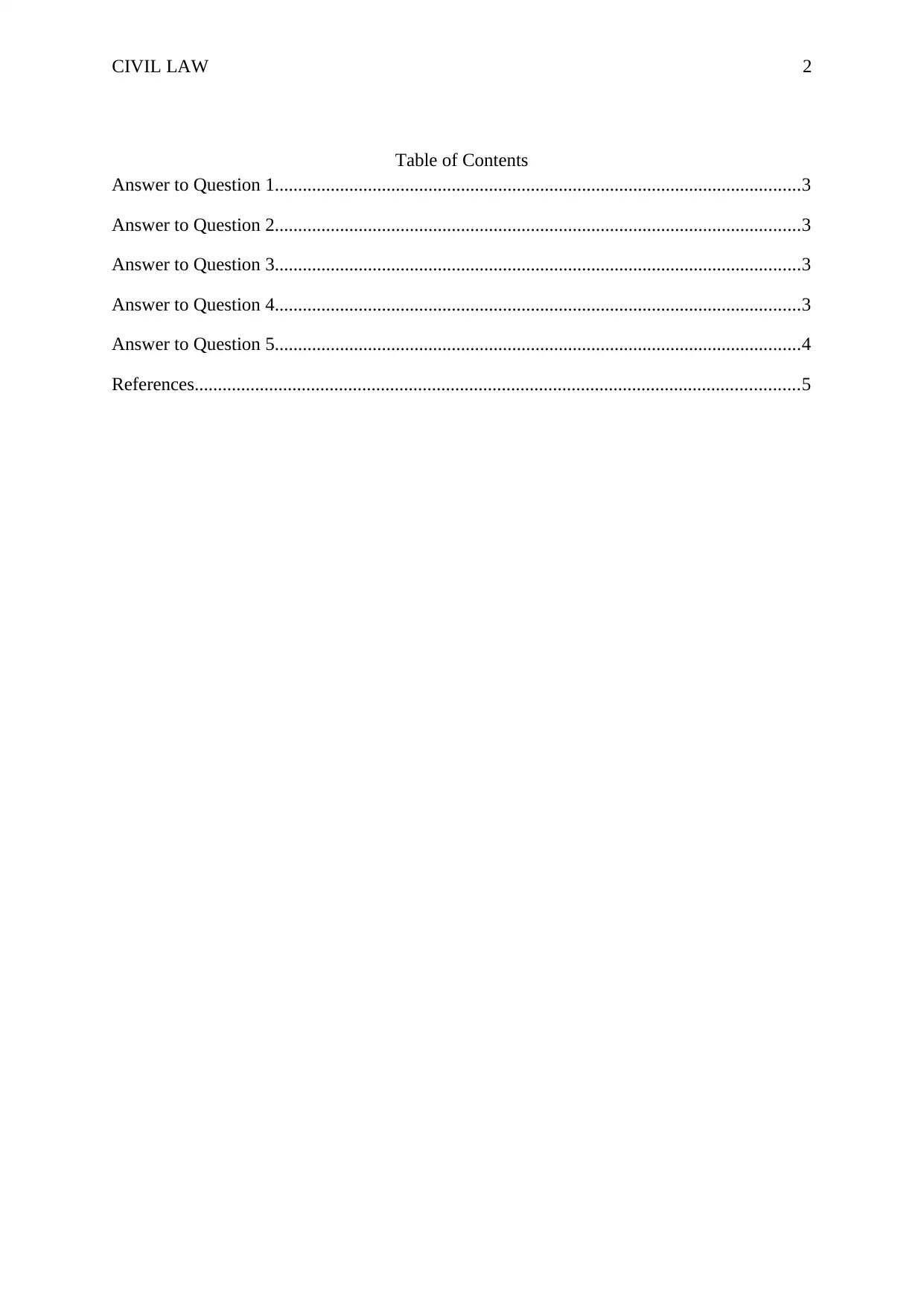
CIVIL LAW 2
Table of Contents
Answer to Question 1.................................................................................................................3
Answer to Question 2.................................................................................................................3
Answer to Question 3.................................................................................................................3
Answer to Question 4.................................................................................................................3
Answer to Question 5.................................................................................................................4
References..................................................................................................................................5
Table of Contents
Answer to Question 1.................................................................................................................3
Answer to Question 2.................................................................................................................3
Answer to Question 3.................................................................................................................3
Answer to Question 4.................................................................................................................3
Answer to Question 5.................................................................................................................4
References..................................................................................................................................5
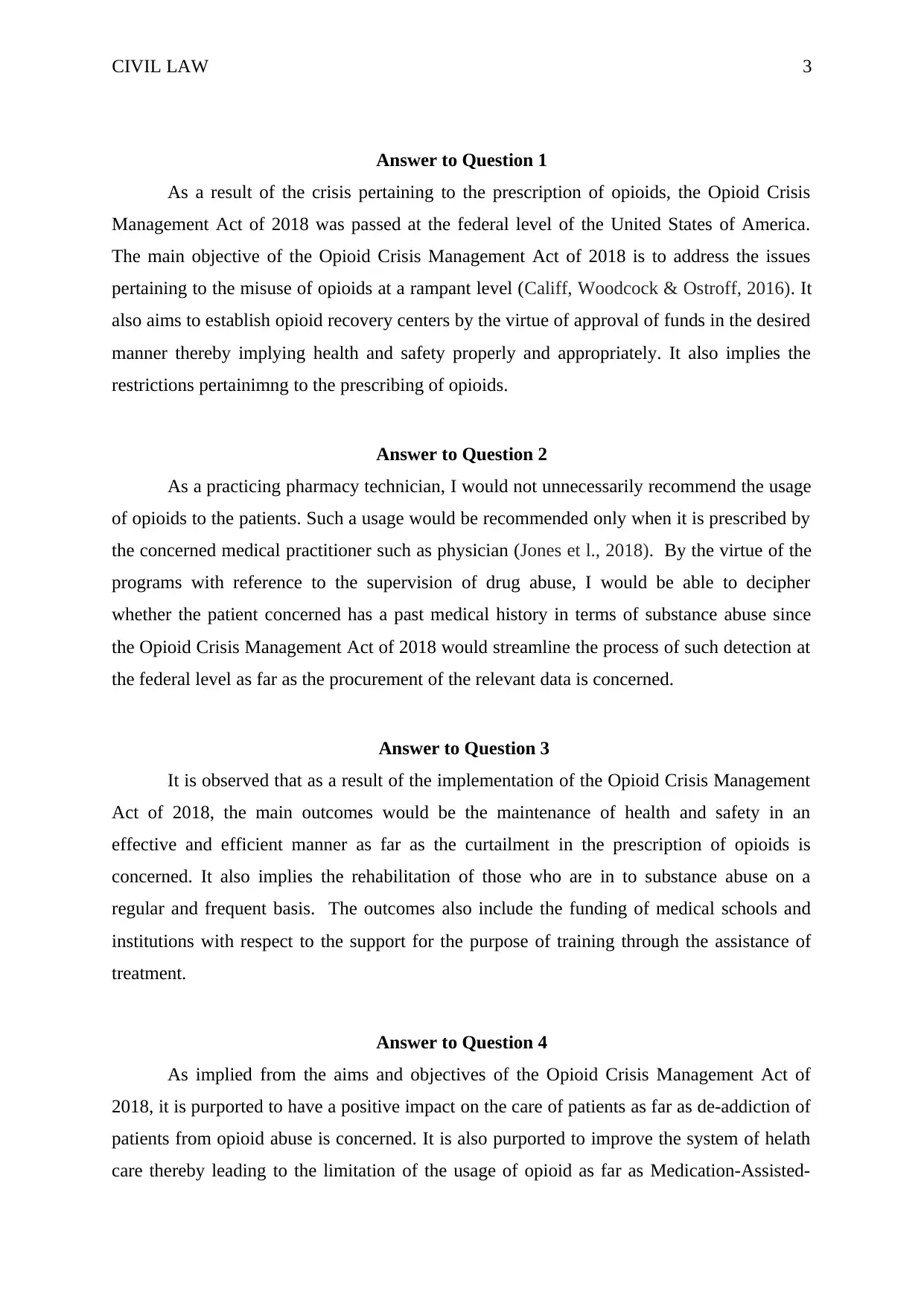
CIVIL LAW 3
Answer to Question 1
As a result of the crisis pertaining to the prescription of opioids, the Opioid Crisis
Management Act of 2018 was passed at the federal level of the United States of America.
The main objective of the Opioid Crisis Management Act of 2018 is to address the issues
pertaining to the misuse of opioids at a rampant level (Califf, Woodcock & Ostroff, 2016). It
also aims to establish opioid recovery centers by the virtue of approval of funds in the desired
manner thereby implying health and safety properly and appropriately. It also implies the
restrictions pertainimng to the prescribing of opioids.
Answer to Question 2
As a practicing pharmacy technician, I would not unnecessarily recommend the usage
of opioids to the patients. Such a usage would be recommended only when it is prescribed by
the concerned medical practitioner such as physician (Jones et l., 2018). By the virtue of the
programs with reference to the supervision of drug abuse, I would be able to decipher
whether the patient concerned has a past medical history in terms of substance abuse since
the Opioid Crisis Management Act of 2018 would streamline the process of such detection at
the federal level as far as the procurement of the relevant data is concerned.
Answer to Question 3
It is observed that as a result of the implementation of the Opioid Crisis Management
Act of 2018, the main outcomes would be the maintenance of health and safety in an
effective and efficient manner as far as the curtailment in the prescription of opioids is
concerned. It also implies the rehabilitation of those who are in to substance abuse on a
regular and frequent basis. The outcomes also include the funding of medical schools and
institutions with respect to the support for the purpose of training through the assistance of
treatment.
Answer to Question 4
As implied from the aims and objectives of the Opioid Crisis Management Act of
2018, it is purported to have a positive impact on the care of patients as far as de-addiction of
patients from opioid abuse is concerned. It is also purported to improve the system of helath
care thereby leading to the limitation of the usage of opioid as far as Medication-Assisted-
Answer to Question 1
As a result of the crisis pertaining to the prescription of opioids, the Opioid Crisis
Management Act of 2018 was passed at the federal level of the United States of America.
The main objective of the Opioid Crisis Management Act of 2018 is to address the issues
pertaining to the misuse of opioids at a rampant level (Califf, Woodcock & Ostroff, 2016). It
also aims to establish opioid recovery centers by the virtue of approval of funds in the desired
manner thereby implying health and safety properly and appropriately. It also implies the
restrictions pertainimng to the prescribing of opioids.
Answer to Question 2
As a practicing pharmacy technician, I would not unnecessarily recommend the usage
of opioids to the patients. Such a usage would be recommended only when it is prescribed by
the concerned medical practitioner such as physician (Jones et l., 2018). By the virtue of the
programs with reference to the supervision of drug abuse, I would be able to decipher
whether the patient concerned has a past medical history in terms of substance abuse since
the Opioid Crisis Management Act of 2018 would streamline the process of such detection at
the federal level as far as the procurement of the relevant data is concerned.
Answer to Question 3
It is observed that as a result of the implementation of the Opioid Crisis Management
Act of 2018, the main outcomes would be the maintenance of health and safety in an
effective and efficient manner as far as the curtailment in the prescription of opioids is
concerned. It also implies the rehabilitation of those who are in to substance abuse on a
regular and frequent basis. The outcomes also include the funding of medical schools and
institutions with respect to the support for the purpose of training through the assistance of
treatment.
Answer to Question 4
As implied from the aims and objectives of the Opioid Crisis Management Act of
2018, it is purported to have a positive impact on the care of patients as far as de-addiction of
patients from opioid abuse is concerned. It is also purported to improve the system of helath
care thereby leading to the limitation of the usage of opioid as far as Medication-Assisted-
⊘ This is a preview!⊘
Do you want full access?
Subscribe today to unlock all pages.

Trusted by 1+ million students worldwide
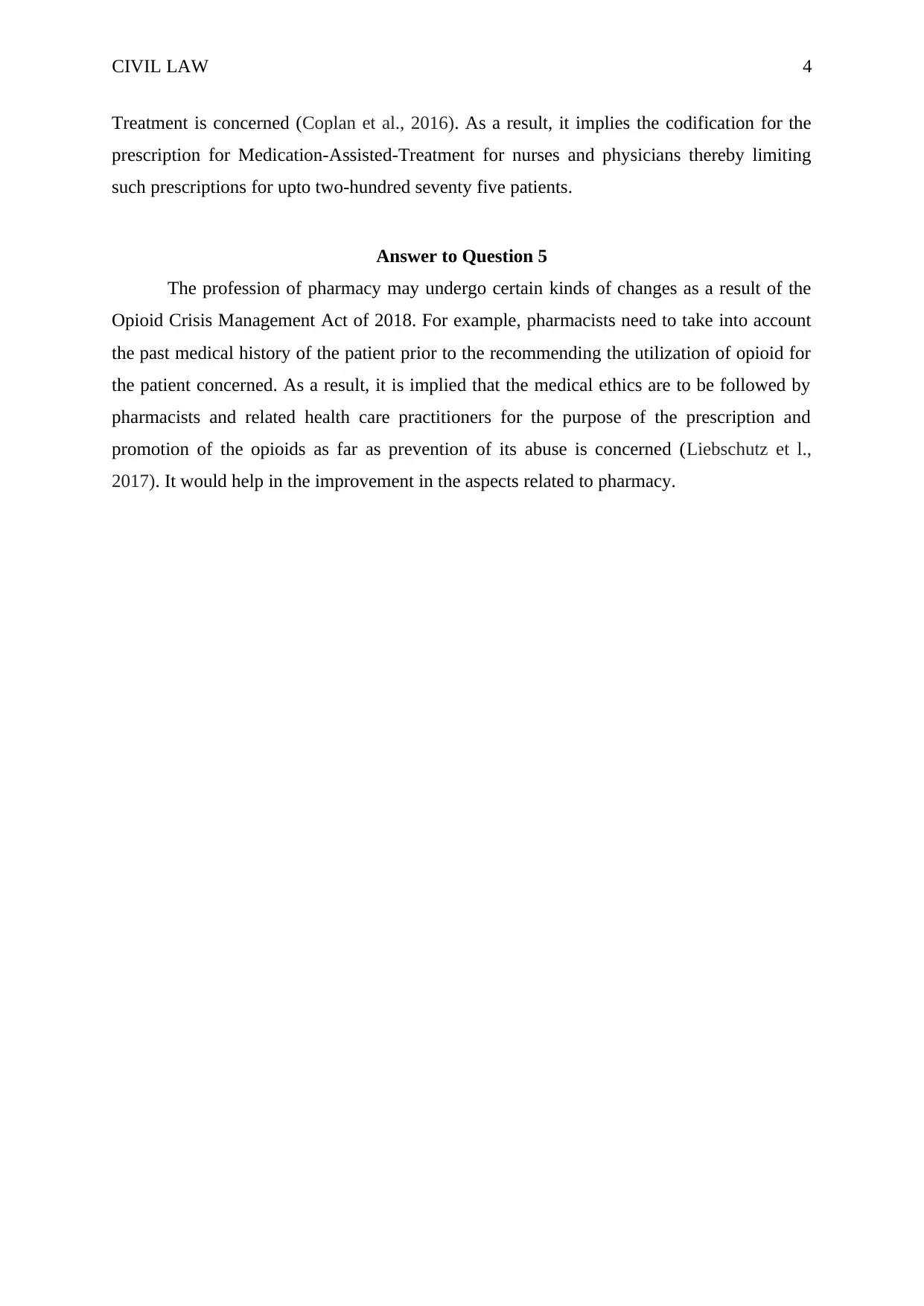
CIVIL LAW 4
Treatment is concerned (Coplan et al., 2016). As a result, it implies the codification for the
prescription for Medication-Assisted-Treatment for nurses and physicians thereby limiting
such prescriptions for upto two-hundred seventy five patients.
Answer to Question 5
The profession of pharmacy may undergo certain kinds of changes as a result of the
Opioid Crisis Management Act of 2018. For example, pharmacists need to take into account
the past medical history of the patient prior to the recommending the utilization of opioid for
the patient concerned. As a result, it is implied that the medical ethics are to be followed by
pharmacists and related health care practitioners for the purpose of the prescription and
promotion of the opioids as far as prevention of its abuse is concerned (Liebschutz et l.,
2017). It would help in the improvement in the aspects related to pharmacy.
Treatment is concerned (Coplan et al., 2016). As a result, it implies the codification for the
prescription for Medication-Assisted-Treatment for nurses and physicians thereby limiting
such prescriptions for upto two-hundred seventy five patients.
Answer to Question 5
The profession of pharmacy may undergo certain kinds of changes as a result of the
Opioid Crisis Management Act of 2018. For example, pharmacists need to take into account
the past medical history of the patient prior to the recommending the utilization of opioid for
the patient concerned. As a result, it is implied that the medical ethics are to be followed by
pharmacists and related health care practitioners for the purpose of the prescription and
promotion of the opioids as far as prevention of its abuse is concerned (Liebschutz et l.,
2017). It would help in the improvement in the aspects related to pharmacy.
Paraphrase This Document
Need a fresh take? Get an instant paraphrase of this document with our AI Paraphraser
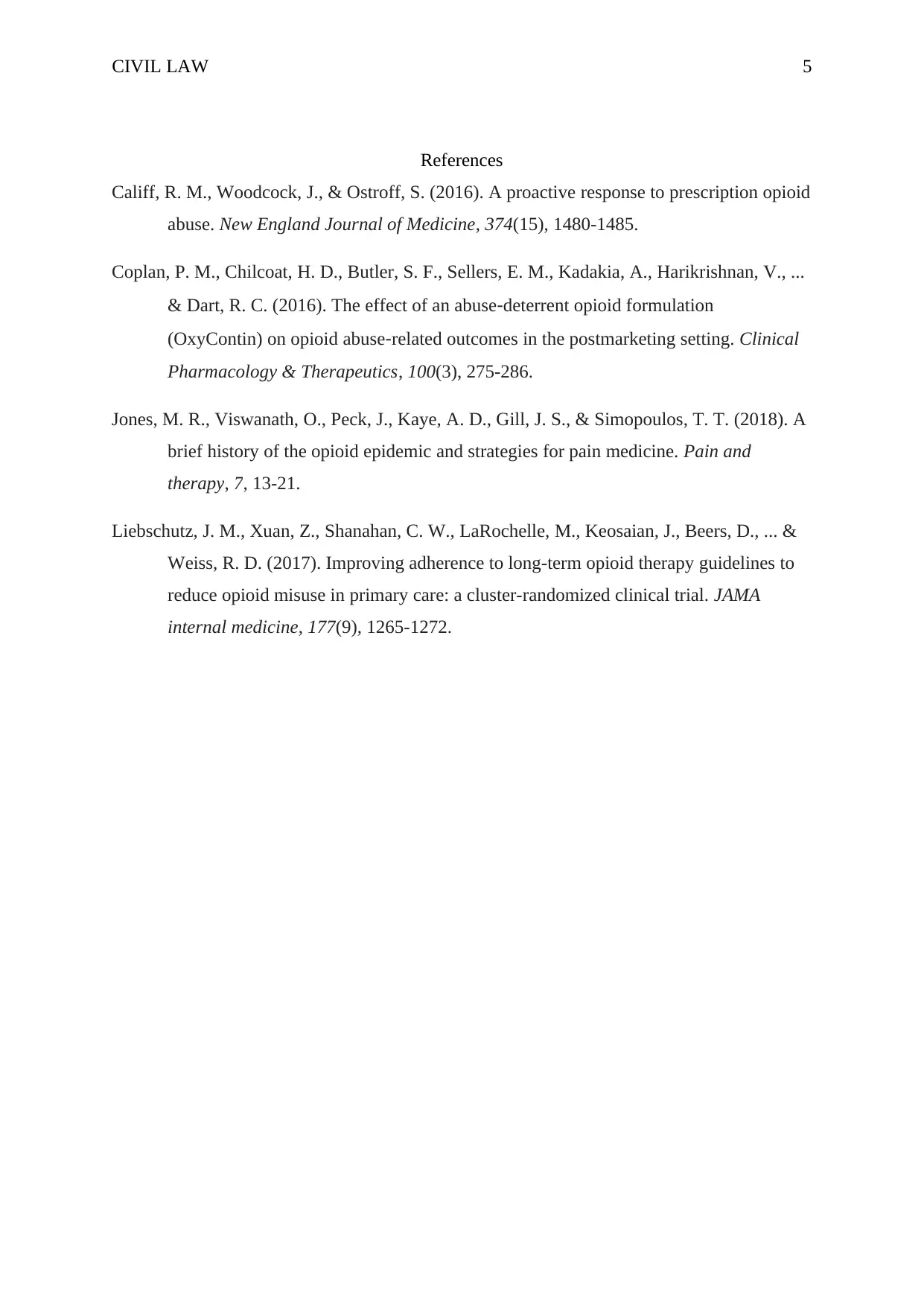
CIVIL LAW 5
References
Califf, R. M., Woodcock, J., & Ostroff, S. (2016). A proactive response to prescription opioid
abuse. New England Journal of Medicine, 374(15), 1480-1485.
Coplan, P. M., Chilcoat, H. D., Butler, S. F., Sellers, E. M., Kadakia, A., Harikrishnan, V., ...
& Dart, R. C. (2016). The effect of an abuse‐deterrent opioid formulation
(OxyContin) on opioid abuse‐related outcomes in the postmarketing setting. Clinical
Pharmacology & Therapeutics, 100(3), 275-286.
Jones, M. R., Viswanath, O., Peck, J., Kaye, A. D., Gill, J. S., & Simopoulos, T. T. (2018). A
brief history of the opioid epidemic and strategies for pain medicine. Pain and
therapy, 7, 13-21.
Liebschutz, J. M., Xuan, Z., Shanahan, C. W., LaRochelle, M., Keosaian, J., Beers, D., ... &
Weiss, R. D. (2017). Improving adherence to long-term opioid therapy guidelines to
reduce opioid misuse in primary care: a cluster-randomized clinical trial. JAMA
internal medicine, 177(9), 1265-1272.
References
Califf, R. M., Woodcock, J., & Ostroff, S. (2016). A proactive response to prescription opioid
abuse. New England Journal of Medicine, 374(15), 1480-1485.
Coplan, P. M., Chilcoat, H. D., Butler, S. F., Sellers, E. M., Kadakia, A., Harikrishnan, V., ...
& Dart, R. C. (2016). The effect of an abuse‐deterrent opioid formulation
(OxyContin) on opioid abuse‐related outcomes in the postmarketing setting. Clinical
Pharmacology & Therapeutics, 100(3), 275-286.
Jones, M. R., Viswanath, O., Peck, J., Kaye, A. D., Gill, J. S., & Simopoulos, T. T. (2018). A
brief history of the opioid epidemic and strategies for pain medicine. Pain and
therapy, 7, 13-21.
Liebschutz, J. M., Xuan, Z., Shanahan, C. W., LaRochelle, M., Keosaian, J., Beers, D., ... &
Weiss, R. D. (2017). Improving adherence to long-term opioid therapy guidelines to
reduce opioid misuse in primary care: a cluster-randomized clinical trial. JAMA
internal medicine, 177(9), 1265-1272.
1 out of 5
Related Documents
Your All-in-One AI-Powered Toolkit for Academic Success.
+13062052269
info@desklib.com
Available 24*7 on WhatsApp / Email
![[object Object]](/_next/static/media/star-bottom.7253800d.svg)
Unlock your academic potential
Copyright © 2020–2026 A2Z Services. All Rights Reserved. Developed and managed by ZUCOL.



